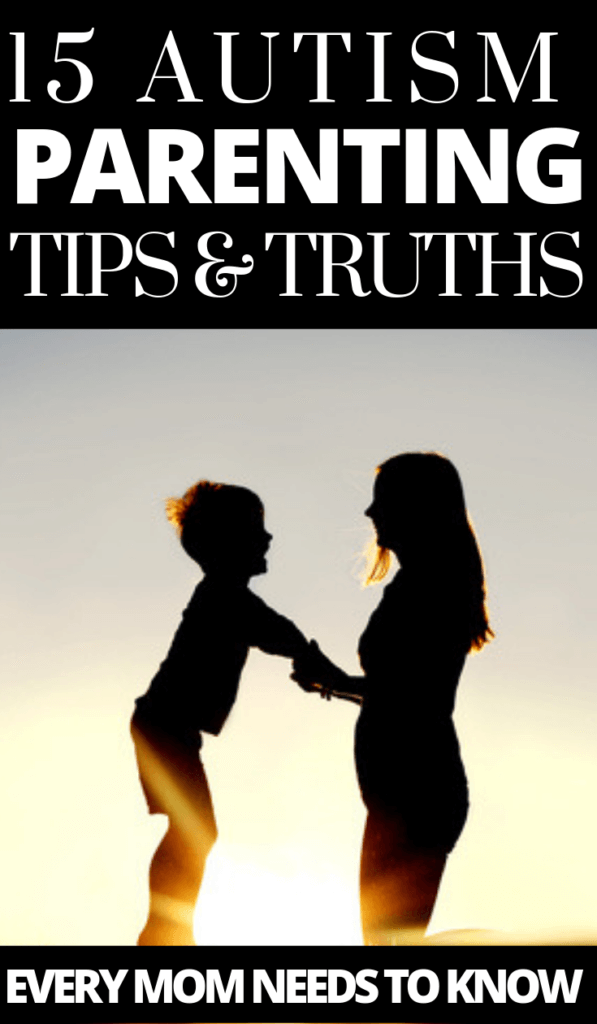If your child or someone you love has recently received an autism diagnosis, chances are you’re overwhelmed and don’t know where to start. These autism parenting tips will help.
Parenting a child with autism is not easy.
You may be feeling a range of emotions from sadness to confusion which are all completely normal.
When my son was diagnosed with autism four years ago I was more than baffled when all his physician gave me was a stack of papers.
I had so many questions, and I needed more support than a printout to give.
You may be in need of similar guidance today, so I’m giving you the 411 and the autism parenting tips that I wish I had four years ago.
There’s a wealth of information on the internet, but trying to validate sources and put the pieces together can take precious moments away from your family, not to mention the frustration.
I’m happy to report that the following 15 tips are truly must-haves when parenting a child with autism.
No time wasters here.

This post may contain affiliate links. For more information, please see my disclosure page.
Your child is still the same person he was before the diagnosis. I know this isn’t part of the plan you had in mind. But remember that some of life’s best journeys are the ones we didn’t plan on taking.
15 Must-Have Autism Parenting Tips
Kick Guilt to the Curb
Moms have a special gift for beating ourselves up. I want you to listen to me. You did nothing to cause this. There is nothing you could have done differently. The diagnosis is not your fault, and God is not punishing you. At first, I felt like I must have been responsible for my son’s diagnosis in some way. Now I understand that God didn’t curse our family with autism. He blessed us with my son.
Educate Yourself About Autism
By educating yourself, you are becoming empowered to be an advocate for your child.
In the beginning, it’s easy to be intimidated by all of the terms, acronyms, and medical jargon.
Don’t worry; the knowledge will come with time.
Now, you can spend time studying the possible causes of autism and the history of the diagnosis, but my recommendation is that you focus on learning what can benefit your child now.
Some of the therapies you may want to look into are ABA (Applied Behavior Analysis), OT (Occupational Therapy), PT (Physical Therapy), IBI (Intensive Behavioral Intervention), and Speech Therapy.
Also, your child will need an IEP (Individualized Education Plan) or a 504 Plan for school. Many states offer early intervention treatment programs which can be written into an IEP. Check with your local school district for more information.
Best Books With Autism Parenting Tips
These books will help you, your friends, and family about autism. Many fantastic books have been written to help understand, teach, and parent children on the spectrum. These are my favorites.
- Ten Things Every Child With Autism Wishes You Knew by Ellen Notbohm. This one is easy to understand and practical. I promise you will have dozens of A-Ha moments as she tells you the reason autistic kids behave in certain ways. She gives you valuable insight and will help you understand your child like nobody else!
- 101 Games & Activities for Children with Autism, Aspergers, and Sensory Processing Disorders One of the best ways children learn is through play. This book provides activities as well as helpful tips
- Autism Every Day: Over 150 Strategies Lived and Learned by Professional Autism Consultant with 3 Sons on the Spectrum Combining real-life stories of challenges and successes, this book outlines over 150 tried-and-true techniques for home, school, and community
- A Parent’s Guide to High-Functioning Autism Spectrum Disorder: How to Meet the Challenges and Help Your Child Thrive Learn how to harness your child’s unique gifts while understanding her struggles
Routine
Consistency is essential when it comes to your child with autism. Children with autism thrive when they are following a routine. A visual schedule is something to consider to help your child with his daily tasks. Visual schedules allow kids to understand the plan and help make transitions from task to task easier.
I recommend this one to help get your child into a routine and stay in one. (I wish I had done this sooner!)
Children with autism find comfort in sorting and organizing their toys.
Stay Positive
I promise this will keep you sane.
Look at the things your child can do first. It’s okay that you want to build upon those skills, of course, you do, but don’t dwell on what he’s lacking. Don’t dwell on what you lack, either.
Steer clear of autism community debates in forums, chatrooms, and Facebook groups. These arguments amp up emotions and lead nowhere. Spend that time taking care of yourself or doing other productive activities.
Safety Measures
Keeping your child safe is a must. Locking cabinets, doors, and other off-limit areas need to be a priority.
Many children with autism have irregular sleep habits. These irregularities in sleep may translate into your child exploring the kitchen at 3 am without supervision. Do everything you can to ensure his safety by keeping hazardous materials out of reach.
You may want to consider individual door locks for your home. Especially on the bathroom doors. My son went through a phase where he enjoyed turning on the bathtub water…and walking away. This resulted in several (hundred) flooding incidents.
Another safety hazard for kids with autism is wandering. See this post on keeping your child safe with gps tracker.
Make a Plan
Raising a child on the spectrum can be very unpredictable.
Children with autism often struggle with meltdowns and having a plan of action for when they do makes a world of difference. Consider creating a calm down kit for home and travel.
Check Your Sources
You’ve gotta watch out online.
Google is an fantastic tool for parents-thousands of fabulous resources are available, but there’s a lot of misinformation as well.
Do not believe everything you read in an autism support group!
Seriously, it can be easy to read about how one child responded well to alternative treatment and get swept away. You are a mother on a mission! Don’t try anything before speaking with your child’s physician. Families have spent thousands of dollars on treatments that have no medical evidence behind them because con artists infiltrated autism forums posing as fellow parents.
Be Patient
It takes time and patience to parent a child on the spectrum. Your child will go through different stages & so will you. It took forever to potty train my son. He was still wearing diapers at 3. I lost sleep for weeks over crazed diaper-related scenarios.
I wish I could go back and do something productive with all of the time I wasted worrying.
Please hear me: It. Takes. Time.
It will be ok.
Get Out Of The House
Take your child and yourself out into the world.
Take him to restaurants, movies, stores, malls, sporting events, whathaveyou. Yes, I know this may make you uncomfortable-perhaps your child’s “stimming” has brought a few glances and embarrassed you-I have been there.
My son once stripped naked in a Dollar General Store and ran up and down on the aisles screaming incoherent babble while my nine year old ran after him shouting “We Don’t Run Naked in Public!”
Was that fun?
Nope.
Did we go back?
Yep.
They know us now.
They know our story.
I make sure to tell everybody I meet about my son now. That took time too. For a long time I couldn’t say “autism” out loud without choking up.
Get Help
Don’t be afraid to ask for help. Caring for a child with special needs can be physically and mentally exhausting. Most areas have a respite program for caregivers. Finding someone to help at home isn’t easy, but it’s worth the extra time in the long run!
Find a group of fellow special needs moms. You need to get out of your house by yourself, and the grocery store does not count. Having someone to bounce ideas off of, or to compare notes with can make all the difference in the world!
Related: Squad Goals! Special Needs Mom Squad Better Than Original According To Experts
You need to reach out and touch someone-online-at church-wherever. Do not assume people know you need it! They are not mind readers!
Insurance
Ok, so this autism parenting tip is more of a taking care of business step, but it is something you need to do. Call your insurance provider and find out what your plan covers.
Chances are your child is going to need Speech Therapy, Occupational Therapy, Physical Therapy, and Applied Behavioral Analysis.
Often these therapies are provided by school districts, but you may want to seek additional private therapists as well.
This often means providing a letter from your Developmental Pediatrician or Psychologist.
Get the wheels in motion now. It’s incredibly frustrating to wait for services due to red tape.
My advice?
Get super friendly-and I mean make Best Friends with someone at Blue Cross Blue Shield or whomever your provider may be. Make sure to include every detail regarding your child’s diagnosis.
Be sure to get a call reference number every time you speak with someone!
Every. Single. Time.
Ask about the difference between in-network provider and the out of network provider. Make sure they explain the differences in cost to you in a way you understand.
If you are not satisfied with the answer, ask to speak with someone else or go the less confrontational route and call back the next day to get another representative.
Early morning is usually the best time to call-there will be less of a wait. I wouldn’t call around 5 pm. Everyone else is!
Activities To Do & Things To Buy
Sensory Play can help your child learn language in the proper context and foster his social interaction skills.
Sensory bins are super easy to set up, and you probably have most of the items you need at home.
We are talking rice, chickpeas, shredded paper, slime, and play dough inside big plastic containers using tools like these or measuring cups like these.
You can also give your child washcloths, scrub brushes, and textured balls for play. See, a lot of kids with autism have trouble with tactile sensitivity, so introducing different textures is always a grand idea.
Consider creating a sensory room for your child. A sensory room will create a relaxed atmosphere for your child where he is surrounded by pleasant sensations and activities. A sensory room may include special lighting, a waterbed, projectors, or bubble tubes.
A sensory gym would include items such as therapy swings, trampolines, ball pits, crash pads, rock walls, tunnels, or tents.
Read: 40 Sensory Play Activities for Kids with Autism
And
55 Heavy Work Activities for Kids with Autism
Toys are often difficult to find. One thing to remember is to not look at age-specific toys or games. Instead, search for toys your child is interested in that you can use to engage him.
Here’s a list of great developmental and sensory toys.
Do Not Compare
Do not compare your child to typically developing children OR other kids on the spectrum. And don’t compare yourself to other mothers – please:)
Comparison is the thief of joy, y’all!
Measure your child’s success based on his accomplishments and how much he has grown and achieved NOT based on how he measures up to your sister’s best friend’s kid who is learning Japanese in the second grade because she’s already mastered Suzuki.
Slow Down & Take A Moment
Take time to love your child for who he is RIGHT NOW.
Today.
Not who he’s going to be, not who he was last night when nobody got any sleep, but at this moment.
Take a deep breath and press pause for a moment. Parenting a child with autism isn’t easy, but you can do it!
You’re not alone.
More Helpful Resources For Autism Moms
50 Tools Every Autism Mom Needs in Her Calm Down Kit
Using A GPS Tracker To Keep Your Child Safe
50 Sensory Diet Activities: What A Sensory Diet Can Do for Kids with Autism
65 Brilliant Toys For Kids With Autism
26 Signs You May Be An Autism Mom
40 Fun Sensory Play Activities
If you found this collection of 15 autism parenting tips helpful, please share it on Pinterest!












